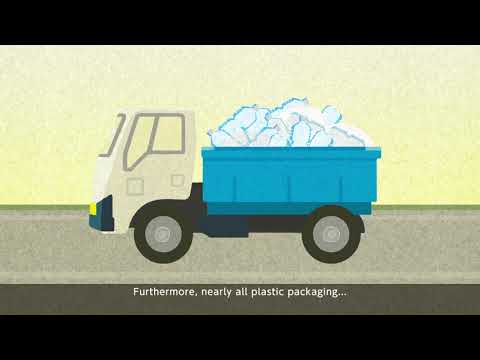In FY2020, sales of the NATULON® Series zippers that use recycled materials increased 88% year-on-year, bringing the proportion of products that use sustainable materials to 6.5% of all products sold. Furthermore, we rolled out NATULON PLUS™ zippers, which contain a higher level of recycled materials, and GreenRise® zippers, which are partially plant-derived. We are also making a phased switchover of SOFIX® products to SOFIX® NATULON® products.
Sustainable Materials
Protecting our global communities through environmental responsibility
Excellent Products are Sustainable Products
How We Make Use Of Sustainable Materials
More on YKK’s NATULON® Series Zippers
YKK always endeavors to contribute to an environmentally friendly society. YKK’s NATULON® product line is designed for customers who want to increase the recycled content of their products.
Learn more about how our NATULON® Series zippers are produced by reusing chemically and material recycled plastic bottles and polyester fibers.
Packing Materials
We proposed a plan to the Japanese Ministry of the Environment to collect and reuse plastic packaging materials used at the time of product shipment by customers (garment factories, etc.) and participated in the “Plastic Smart” campaign organized by the ministry in order to raise awareness of optimal plastic disposal and recycling methods.
Reduction and Recycling of Waste
The amount of generated waste declined with the fall in production volumes due to the COVID-19 pandemic. However, we will continue reducing the generation of waste through measures such as the updating of our production facilities. Moreover, by proactively selecting recycling companies to handle waste disposal, we now have six plants with a recycling rate of 100% and 13 plants with a recycling rate of more than 90% globally.
Reducing Resource Usage
The YKK Group considers waste to be a resource, and all sites worldwide contribute to the development of a recycling-based society by recycling waste and improving the yields of manufacturing processes. In FY2005, our production bases in Japan achieved net zero emissions of waste. Overseas, we are working to reduce landfill waste volumes by reusing resources and improving recycling rates, taking into consideration specific conditions in each country and region. Going forward, we will continue to reduce the total amount of waste we generate and improving recycling rates.
Social Responsibility of Emitters
We introduced electronic manifests to ensure proper management and disposal of industrial waste. Each year, we perform systematic on-site assessments of waste processors regarding contract and manifest management, waste management and disposal conditions, environmental and crisis management measures, relationship with local communities, and other factors based on check lists.

On-site confirmation


